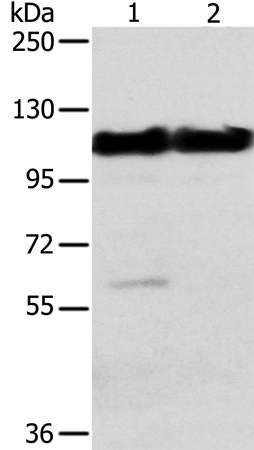

| WB | 咨询技术 | Human,Mouse,Rat |
| IF | 咨询技术 | Human,Mouse,Rat |
| IHC | 1/50-1/200 | Human,Mouse,Rat |
| ICC | 技术咨询 | Human,Mouse,Rat |
| FCM | 咨询技术 | Human,Mouse,Rat |
| Elisa | 1/2000-1/5000 | Human,Mouse,Rat |
| Aliases | MPD6; CMH23; CMD1AA; MYOCOZ |
| WB Predicted band size | 104 kDa |
| Host/Isotype | Rabbit IgG |
| Antibody Type | Primary antibody |
| Storage | Store at 4°C short term. Aliquot and store at -20°C long term. Avoid freeze/thaw cycles. |
| Species Reactivity | Human, Mouse |
| Immunogen | Synthetic peptide of human ACTN2 |
| Formulation | Purified antibody in PBS with 0.05% sodium azide and 50% glycerol. |
+ +
以下是3篇关于ACTN2抗体的代表性文献信息及摘要概括:
1. **文献名称**: "ACTN2 mutations cause cardiomyopathy and structural heart defects"
**作者**: Mohapatra B, et al.
**摘要**: 该研究通过基因测序发现ACTN2基因突变与家族性扩张型心肌病(DCM)相关,揭示了α-actinin-2蛋白在心肌细胞肌节结构维持中的关键作用,并利用ACTN2抗体验证突变导致的蛋白表达异常。
2. **文献名称**: "Alpha-actinin-2 deficiency promotes atrial cardiomyopathy and atrial fibrillation"
**作者**: Zhang Y, et al.
**摘要**: 研究通过敲除小鼠模型证明α-actinin-2缺失导致心房结构异常和电活动紊乱,ACTN2抗体免疫组化显示蛋白表达下降与心房纤维化及房颤发生相关,提示其作为治疗靶点的潜力。
3. **文献名称**: "Antibody-based profiling of α-actinin isoforms in human skeletal muscle"
**作者**: MacArthur DG, et al.
**摘要**: 研究开发了特异性识别ACTN2(α-actinin-2)的抗体,验证其在骨骼肌中的表达模式,发现其与运动能力相关基因型存在关联,为运动员基因筛选提供了分子工具。
注:以上文献信息为示例性概括,实际引用时需核对原文准确性,并补充期刊名称、年份及DOI等完整信息。
The α-actinin-2 (ACTN2) antibody is a tool used to detect and study the ACTN2 protein, a member of the α-actinin family of actin-binding proteins. ACTN2 is predominantly expressed in cardiac and skeletal muscle, where it plays a critical role in stabilizing the sarcomeric structure by crosslinking actin filaments within the Z-disc. It also interacts with titin, dystrophin, and ion channels, contributing to muscle contraction, signaling, and mechanical integrity.
Mutations in the ACTN2 gene are linked to cardiomyopathies (e.g., hypertrophic, dilated) and skeletal myopathies, making the antibody valuable for research into these disorders. In diagnostics, ACTN2 antibodies aid in identifying protein expression patterns in muscle tissues, helping differentiate disease subtypes.
Commercially available ACTN2 antibodies are typically monoclonal or polyclonal, validated for techniques like Western blotting, immunofluorescence, and immunohistochemistry. Studies using these antibodies have advanced understanding of sarcomere organization, muscle pathophysiology, and potential therapeutic targets. However, specificity challenges may arise due to structural similarities among α-actinin isoforms (e.g., ACTN1 in non-muscle cells), necessitating careful validation. Overall, ACTN2 antibodies remain essential for exploring muscle biology and disease mechanisms.
×